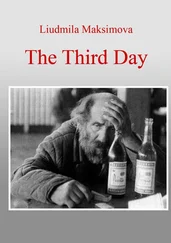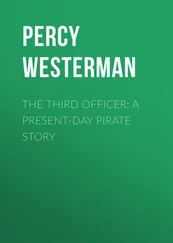David Epperson - The Third Day
Здесь есть возможность читать онлайн «David Epperson - The Third Day» весь текст электронной книги совершенно бесплатно (целиком полную версию без сокращений). В некоторых случаях можно слушать аудио, скачать через торрент в формате fb2 и присутствует краткое содержание. Жанр: Фантастика и фэнтези, на английском языке. Описание произведения, (предисловие) а так же отзывы посетителей доступны на портале библиотеки ЛибКат.
- Название:The Third Day
- Автор:
- Жанр:
- Год:неизвестен
- ISBN:нет данных
- Рейтинг книги:3 / 5. Голосов: 1
-
Избранное:Добавить в избранное
- Отзывы:
-
Ваша оценка:
- 60
- 1
- 2
- 3
- 4
- 5
The Third Day: краткое содержание, описание и аннотация
Предлагаем к чтению аннотацию, описание, краткое содержание или предисловие (зависит от того, что написал сам автор книги «The Third Day»). Если вы не нашли необходимую информацию о книге — напишите в комментариях, мы постараемся отыскать её.
The Third Day — читать онлайн бесплатно полную книгу (весь текст) целиком
Ниже представлен текст книги, разбитый по страницам. Система сохранения места последней прочитанной страницы, позволяет с удобством читать онлайн бесплатно книгу «The Third Day», без необходимости каждый раз заново искать на чём Вы остановились. Поставьте закладку, и сможете в любой момент перейти на страницу, на которой закончили чтение.
Интервал:
Закладка:
***
I asked Bryson to hand me the camera in exchange for my money bag, just in case Decius asked the Professor to demonstrate what he had found, but my concerns were unfounded. The Roman said nothing to us when we returned. Instead, he and the wounded men in the wagon appeared to be telling each other jokes.
My first platoon sergeant had done the same thing, and for the same reason, I guessed: to lift their spirits and thus enhance their odds of survival.
The rest of our party was in surprisingly good humor as well, despite the fact that by modern Western standards, they had seen more than a lifetime’s worth of violent death. Once we pulled away from the scene itself, Bryson, Lavon and Sharon began to relate to each other their impressions of what they had witnessed.
Only Markowitz stayed out of the conversation. He just stared back in silence at the birds circling over the battle site.
After a little while, I grew concerned. “You OK there, buddy?” I asked.
He didn’t reply.
Without acknowledging me at all, he stepped over to Lavon and tugged on his shoulder. “Robert, can you ask this centurion what will happen to those bodies?”
Lavon did so, but the Roman officer just looked at him blankly and shrugged, as if unable to comprehend why anyone would care.
Quite frankly, I wondered the same thing.
Decius turned and said something to the men in the wagon. It must have been another joke, for the injured soldiers began laughing uproariously.
Lavon told me later what they had said.
“The dogs and vultures must eat, too,” replied one of the legionnaires. “Would the gods approve of us depriving them of their sustenance?”
As the soldiers burst out in laughter again, Lavon chuckled along with them. As for me, I put the issue out of my mind.
I shouldn’t have.
Chapter 18
We marched for close to an hour before Publius brought our column to a halt just outside a small village. As soon as we stopped, the Romans launched into a well-drilled routine. Two lookouts scrambled up the nearest hill, about twenty yards away, where they stood with their backs to each other, each scanning a semicircle for potential threats.
Two unlucky squads — the Roman term was contuburnia , Lavon explained — remained on guard while the others dropped their heavy burdens and quickly found shade underneath nearby olive trees, though an additional group of soldiers did not begin their break until they had erected an improvised cover to shield the wounded men in the wagon from the sun.
As the soldiers rested, four servants who had accompanied them carried jugs of water and ladled refreshment out to each man before scurrying back to the center of the village to fill their containers from a crudely dug well.
Like the soldiers, Bryson and Markowitz headed for some large rocks underneath a shade tree. By contrast, Lavon and Bergfeld ran straight up a small hill to the edge of a three-foot stone wall that enclosed a flat, hard-packed surface about twenty-five feet in diameter. I decided to join them.
Sharon trained her sight on what looked like a sled leaning against the opposite side. Pieces of it were flaking away at the edges, and compounding its bedraggled appearance, dozens of rock fragments were embedded into the wood on one side. To me, it belonged either in a landfill or as decor in a cheap, all-you-can-eat steak house.
“Wow, check that out!” she said.
Lavon seemed equally excited. I followed them around the wall’s perimeter but finally had to ask.
“What’s so interesting about that piece of junk?”
The subject of their enthusiasm turned out to be a threshing floor, and what I took for a sled was actually the threshing machine. Local farmers would pile their sheaves of grain on the hard surface and hook up the sled behind a donkey or an ox, fragment side down.
Then, they’d pile stones on top of the sled for extra weight, and the animal would drag the thing back and forth, shredding the sheaves and separating the grain from the straw. The whole process sounded terribly inefficient.
“I thought they just threw it up in the air and let the wind blow away the chaff,” I said.
“That was the next step,” Bergfeld replied.
I was right about the inefficiency, though. Lavon explained that anyone who could afford to mounted iron blades on the underside of the sled. This thing was better than nothing, but just barely.
“These people are really poor,” he said.
I glanced around at the surrounding structures and could not argue. Only in the loosest definition of the term could they be called buildings. The best of them consisted of rough, unfinished stone, held together by an altogether inadequate amount of mortar. Most didn’t even have roofs. Instead, they were covered by a thick black fabric.
“It’s goat hair,” said Lavon. “It works better than you’d think. The hair expands as it gets wet, so it does a reasonably good job of keeping out the rain; and when it dries, the small open spaces allow for some air circulation.”
I mumbled something about preferring shingles, but they paid me no mind and went charging ahead. I followed along and stood behind them as they poked their noses into the next house. Inside this one, a crude, unfinished table rested in the center, while two equally rudimentary benches sat to either side. One had toppled backwards.
The occupants had mounted a rough-hewn wooden shelf on the back wall, but it held nothing; and the only other object in sight was a broken pot on the floor.
“Someone left in a hurry,” I said.
“I think they all did,” said Lavon. “They probably heard the soldiers coming and decided not to stick around. I’m sure word of the skirmish this morning has already gone ahead.”
That jolted me into glancing back toward the road. Given the side we had chosen — or rather had chosen for us — I didn’t want to be too far from the Romans if any of the village’s residents decided to come back early.
My companions, though, had other things on their minds. By the time I caught up to them at the top of the next hill, they were chattering excitedly; this time over a house on the other side — built atop what looked like a cave.
“It’s nice to know modern archaeology got something right,” said Lavon. “This is exactly what I’ve always pictured a first century Judean house looking like.”
“The family stays upstairs,” said Bergfeld. “When the weather is nice, as it often is around here, they’ll sleep under the stars on the flat roof.”
“Who lives on the lower level? Livestock?”
“Yes,” said Lavon, “along with household servants, if they have any. It’s quite a clever setup. They take full advantage of the terrain in an environment where construction lumber is prohibitively expensive.”
I glanced back around. “Clever” wasn’t the first word that occurred to me.
Taken as a whole, the ramshackle village reminded me of a more primitive version of a third world shantytown, though I suppose as in those places, these people did the best with what they had, which wasn’t much.
“Jesus would have been born in something like this,” said Lavon.
“This?” I asked.
“Not this particular town, of course, but it was this kind of house, we think. The upstairs part was full, so Mary and Joseph had to go to the lower level. It wasn’t quite as bad as the modern English version of the Christmas story makes it out to be. The mean old innkeeper wasn’t exiling them to the barn.”
“Childbirth without anesthetics — that would have been the bad part,” said Bergfeld.
I had never thought of it that way, nor had most men I was sure.
“How many people would you estimate live here?” I asked.
Читать дальшеИнтервал:
Закладка:
Похожие книги на «The Third Day»
Представляем Вашему вниманию похожие книги на «The Third Day» списком для выбора. Мы отобрали схожую по названию и смыслу литературу в надежде предоставить читателям больше вариантов отыскать новые, интересные, ещё непрочитанные произведения.
Обсуждение, отзывы о книге «The Third Day» и просто собственные мнения читателей. Оставьте ваши комментарии, напишите, что Вы думаете о произведении, его смысле или главных героях. Укажите что конкретно понравилось, а что нет, и почему Вы так считаете.












